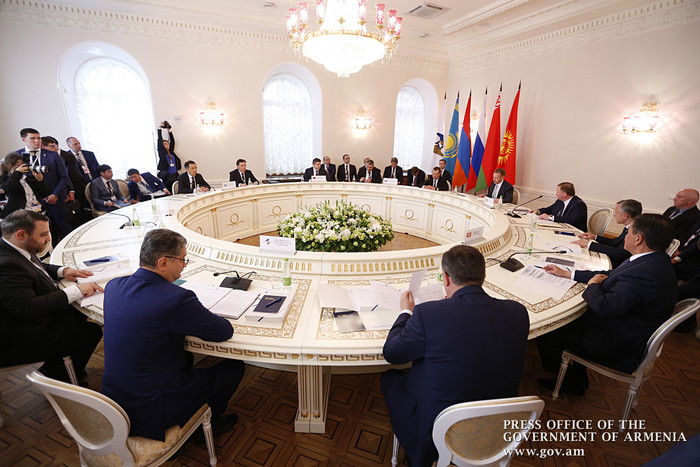The Prime Minister Karen Karapetyan-led government delegation attended today the planned narrow-format and enlarged meetings of the Eurasian Intergovernmental Council in Kazan.
Taking the floor, the Prime Minister of Armenia thanked the Russian side and his Russian counterpart Dmitry Medvedev for a warm welcome and excellent organization of the meeting.
Touching upon the ongoing integration-driven cooperation within the EAEU frameworks, Karen Karapetyan stated in part, “Armenia has always stated that this platform is exciting, promising and important for our country and its economic development. I would like to highlight a number of key issues that we have discussed today in a narrow format.
Firstly, it is the Union’s digitization agenda. We support the idea of setting a digital agenda as we believe it important. We must continue working in this direction, especially considering that there are such systems more or less operational in the member countries.
We should make a point of it to ensure their interaction. If we manage to build up the necessary cooperation and coordination tools, we will be able to unite these separate systems into a single technological platform.
Secondly, we need to cooperate towards the elimination of existing obstacles and barriers. We have been presented an analysis on the shortfalls. The Armenian side stated that all the shortcomings will be addressed. This line of work is very helpful, because it can diversify our mutual economic relations.
We are in favor of the adoption of the procedure outlined in the agro-industrial complex and have already sent recommendations to the Commission regarding the planned research activities on topics to cover in accordance with the two-year plan. Regarding today’s agenda, I would also like to highlight the one-stop-shop principle. I think it is quite an interesting tool. We have already built up some experience. We have made tangible progress in this area, which as of yet is not systematic.”
The Eurasian Economic Union-member States’ prime ministers went on to discuss issues related to the deepening of integration cooperation in the fields of economy and customs administration, as well as in industry and agro-industry.
The meeting resulted in the signing of several documents: an action plan to deal with the restrictions in the Eurasian Economic Union’s internal market, the procedure to be followed by member countries in coordinating with the Eurasian Economic Commission and conducting relevant proceedings in connection with the provision of subsidies for industrial products, the development of the one-stop-shop principle in streamlining foreign economic activities, a procedure for the conduct of joint research and experimental regulations in agro-industry, the monitoring of the regulatory impact assessment of draft decisions on the annual report of the EAEC in 2016 and others.




















































